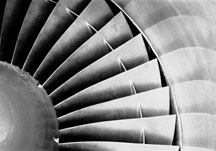|

Learning
to Fly In Queens
by
Jacob M. Appel
Our
obsession with flight has long been a dominant feature of the
national psyche. Generations of schoolboys have longed to follow
in the footsteps of Charles Lindbergh and Neil Armstrong. For
these young men—and in recent years, young women—two long-standing
Queens institutions can help keep their flying dreams alive: Aviation
High School (AHS) and The College of Aeronautics.
“The
sky’s the limit,” explains Eileen Taylor, principal of AHS. During
her decade as principal, a position she insists is “the best job
in the world,” she has witnessed hundreds of high school students
acquire FAA certification in the servicing and repair of powerplant
equipment and airframe structures. She has also witnessed a small,
predominantly campus-based curriculum expand into a program emphasizing
internships, summer camps and even on-site training at a Kennedy
Airport hangar. Many of the major airlines offer opportunities
for ambitious AHS students to gain hands-on experience.
“There’s
a tremendous demand for mechanics,” notes Taylor. “The airlines
are so pleased with our students; they need well-trained professionals.”
For the students, there is a magic that extends well beyond job
security. Tenth grader Andres Rendon, recently returned from an
Experimental Aircraft Association camp in Wisconsin, has “just
one thing to say” about his experience: “It was awesome!” It takes
little pushing to convince Rendon, an aspiring pilot, to describe
his first-ever experience at the controls of an airborne plane.
It wasn’t at all frightening, he said, “not even the flips.” Then
he explained the detailed maneuvers undertaken by the RV-6A aircraft
with the precision and complex technical jargon of a well-versed
authority. The EAA camp is just one of numerous extra-curricular
opportunities built into the AHS curriculum.
Two future mechanics, Radek Murawski and Stan Kapustyansky, both
spoke of the satisfaction of building things with their hands.
“I’ve always been fascinated by planes,” said Kapustyanksy. “Working
on planes also teaches you other skills like leadership and teamwork.”
Both seniors are considering a special five-year program that
enables AHS students to acquire certification in both airframe
and powerplant. And they are both strongly considering continuing
their studies at college. Boasting some of the highest academic
standards in the city—last year students scored over 96 percent
on regents’ exams in English, American history and global studies
as well as 97 percent on FAA licensing exams—AHS sends its top
students to some of the nation’s leading research universities
and military academies. Many other graduates use their advanced
placement credits in mathematic and physics to get a head start
at the nearby College of Aeronautics.
The demand for College of Aeronautics graduates is so strong that
it even surprises Peter Grant Jordan, Vice-President for Enrollment
and Student Services. “There are more aircraft in the air these
days and more air traffic means a greater need for maintenance
and repair. There has also been a lot of attrition in the industry
due to retirements, so there’s an enormous demand for trained
mechanics and FAA-certified technicians,” he explained.
The College offers a diverse selection of programs to meet the
needs of an increasingly non-traditional student body. The school
boasts a state-of-the-industry Fasca 142 flight simulator and
a slew of donated aircraft. But its most distinguishing feature
may be a control tower adjacent to LaGuardia Airport from which
students, through a special arrangement, can listen to air traffic
controllers at the airport directing traffic while watching the
results of these directions. “The students really appreciate this,”
Jordan explained. “Hands-on experience is becoming more and more
important in the job market. Our observation tower offers students
a truly unique opportunity to be part of the life of the airport.”
If dreams of flight know no cultural boundaries, the college seems
to determined to make sure that their realization is equally available
to all. The school is as racially and ethnically diverse at the
city from which the students come. The percentage of female students
is small, reflecting an industry-wide trend, but growing.
“Many
of our students are from the first generation in their families
to attend college,” noted Jordan. “A large number are new immigrants.
One of our primary goals is to show them that they can make it
and to offer than an education that they can afford.”
Taylor tells the story of one young woman, Maria, who desperately
wanted to attend AHS despite scores that did not meet the admissions
requirements. She came from the Bronx to Taylor’s office every
day for a week at the start of the school year, begging admission.
The two finally made an arrangement whereby if Maria met certain
standards at her local high school for sixth months, she would
gain admission to AHS—which she ultimately did.
Taylor uses her story as a basic lesson on the rules of flight:
it takes persistence and hard work.
Education Update, Inc., P.O. Box 20005, New York, NY 10001. Tel:
(212) 481-5519. Fax: (212) 481-3919. Email: ednews1@aol.com.
All material is copyrighted and may not be printed without express consent of
the publisher. © 2001.
|

